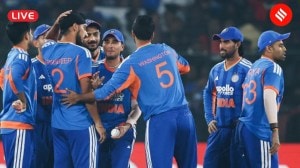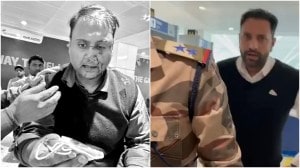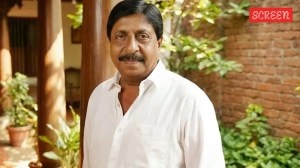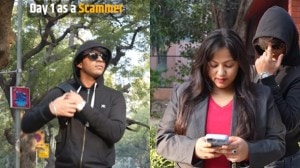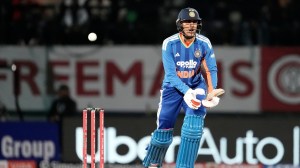As a Gandhi family confidant, a senior Congress leader entrusted with key responsibilities and a politician with friends across party lines, Ghulam Nabi Azad has been a part of the power nucleus for decades – witness to important decisions shaping the country, as well as to the machinations, intrigue and coups of the grand old party.
Even at a time when the Congress has been beset with defections, Azad’s was one of the most painful for the party. A month after he left the Congress last year, Azad had floated his own party and at 71, is hoping for a new political beginning in native Jammu and Kashmir.

In his autobiography Azaad, published by Rupa and releasing on Wednesday, Azad gives a glimpse of some of the turns of history he has been a part of. Some excerpts:
On Prime Minister Narendra Modi
Azad writes about knowing Modi since long and sharing warm ties with him. “I found Modi to be a great listener. Not even once did he rebut my arguments or speak against me, inside or outside Parliament. He would always remain calm, though he would taunt me by making some political references. But he never attacked me personally. This may also have been because, unlike other leaders, I would not call the PM or other members of the ruling party names or abuse them.”
Azad adds that this was unlike some Congress leaders who “feel that abusing the Opposition and calling names is the only way to fight (a) political rival”.
He goes on to talk about the speech given by the PM at his farewell in the Rajya Sabha. It “should have been a matter of great pride for the Congress party as well as its leadership, as a senior member of the party was feted by none less than the PM and by the leaders of other Opposition parties. Unfortunately… the party leadership was extremely unhappy and critical.”
The G23 rebel group within Congress
Azad talks about the letter that G23 leaders wrote to Sonia in August 2020 seeking widespread changes in the way the Congress was run, calling it “the beginning of the end”. “Unfortunately, instead of taking this letter as a wake-up call and strengthening the organisation and holding party elections on the lines we had suggested, both Rahul and Sonia ji took offence and viewed it as a challenge to their authority. Instead of heeding our advice, they dubbed us as being pro-BJP… If we were pro-BJP… we would simply let things continue as they are and make the dream of a Congress-mukt Bharat (Congress-free India) – which the current leadership seems to have embarked upon – come true.”
Story continues below this ad
Azad writes about how he was dropped as general secretary immediately after the letter. “I was also dropped from the national star (campaigners list) after 40 years… This was despite the fact that I have always liked party work more than government or parliamentary duties.”
 Democratic Progressive Azad Party (DPAP) chief Ghulam Nabi Azad reads from his memoir, ‘Azaad’ (PTI)
Democratic Progressive Azad Party (DPAP) chief Ghulam Nabi Azad reads from his memoir, ‘Azaad’ (PTI)
On Rajiv Gandhi’s entry into politics
Azad writes about his meeting with Indira Gandhi in July 1980, 40 days after her younger son Sanjay Gandhi’s death. He says that after talking about the activities of the Youth Congress, she took him by surprise by placing a few newspapers before him.
“She asked if I had seen them. I replied in the affirmative. She asked, ‘What did you see?’. ‘Nothing unusual,’ I replied. ‘Didn’t you notice the news item which said that Maneka (Sanjay’s wife) had attended a tree plantation programme…? It is not even 40 days since Sanjay’s death and she is already attending events. How could she do it!
“There was no anger in Indira ji’s voice. I wondered if I should respond. I decided to keep quiet, considering that it was a family matter… We then spoke of other matters. She suddenly shot another question: ‘Don’t you think Rajiv should join politics?’
Story continues below this ad
Azad writes that Indira then told her Rajiv was reluctant, and that the next day, he had met her with a strategy – that state units of the Youth Congress should make passionate appeals seeking Rajiv’s entry into politics, followed by national office-bearers. “Indira ji liked the suggestion,” he writes.
Azad says it was he who also proposed to Indira that the Congress celebrate Sanjay’s birth anniversary, that fell a few months later, in a big way to keep his legacy alive. Then, at a massive public meeting where both Indira and Rajiv were present, he says, he exhorted Rajiv to enter politics.
“Indira ji clapped the loudest; she seemed pleased. As I took my seat next to her, she patted me on the back and whispered that I had delivered a really good speech.”
The 1991 PM race
Azad writes that there were many contenders for the Prime Minister’s post in 1991, the election the Congress won after Rajiv Gandhi’s assassination – among them, Arjun Singh, Sharad Pawar and N D Tiwari.
Story continues below this ad
“Arjun Singh, though a capable administrator and popular national leader, was at loggerheads with other senior leaders of his own state of Madhya Pradesh, such as Madhavrao Scindia, Motilal Vora and the Shukla brothers – Shyama Charan Shukla and Vidya Charan Shukla. Another reason against him was that only two-and-a-half years earlier, he had had to give up the chief ministership of Madhya Pradesh… because of the Churhat Lottery controversy,” Azad says.
About Pawar, he lists plus points such as his age, the fact that he represented one of the biggest states of the country, his “resourcefulness” and his “rapport” with leaders of other political parties.
“Unfortunately, he could not qualify as a candidate,” Azad writes. “It was pointed out that he had joined the Congress party only two-three years back. Doubts were raised on whether he would gel with the party rank and file.”
With N D Tiwari’s candidature a “non-starter”, Azad adds: “After it was certain that a broad consensus in the party had formed in favour of (P V Narasimha) Rao, I met Sonia ji and discussed the issue with her. She said that Rao was a fine man and a good choice,” he says.
Story continues below this ad
Post-Babri Masjid demolition
Azad recalls how the demolition of the Babri Masjid, which happened while the Winter Session of Parliament was on, saw the Opposition seeking the resignation of PM Rao and Home Minister S B Chavan. The party’s bridge to other parties as the Parliamentary Affairs Minister, Azad managed to buy peace by assuring Opposition leaders that while Rao’s resignation would push the country into elections, which would be rash in a charged atmosphere, he could get Chavan to resign.
“I extracted a commitment from them that once the decision was made, they would let the House function. The PM was not a part of these discussions, nor did he even once take the initiative to break the impasse. I went to Rao’s residential office with the formula…The PM heard me out and asked me to contact Chavan and convey the decision. I declined, saying that he, as the PM, should seek the resignation. However, he insisted that I must go to Chavan’s residence and ‘prepare’ him for the resignation and then ask him to see Rao at his Parliament office at 4.00 pm. The PM also told me to be present at the meeting.”
Not only did Chavan not show up, he was not to be seen for some days after that, Azad writes. “One day passed, two days went by and then three, but there was no sign of Chavan’s resignation. The Opposition began getting restless, and I rushed to the PM. He told me with a straight face that Chavan had ‘disappeared’. He could not contact him! ‘Let’s forget it,’ he remarked… Today, when I think about it, I realise that Rao had played a crafty trick on me.”
Azad notes that Rao and Chavan “shared a great personal rapport and friendship” since their student days, with Chavan’s hometown Marathwada and Rao’s home both part of the Hyderabad State before Partition. “Rao must have advised him to go underground for some time and resurface after the storm blew over.”
Story continues below this ad
Rao’s ouster as Congress president
Azad talks at length about the CWC meeting that took place after the Congress’s defeat in 1996. He says he and several leaders met at K Karunakaran’s residence on the eve of the meeting and planned to seek Rao’s resignation as Congress president.
“Thus, the next morning, as everyone settled down at the CWC meeting, I rose and said that before the deliberations could begin, I wished to make a brief statement.”
Azad says he told Rao bluntly that although he was one of the best PMs the Congress had had, he was the “worst president” the party had seen. “’You had no interest, aptitude or time for organizational work. This is the reason why we lost the elections.’ I continued as Rao listened impassively,” he writes, adding: “Not one member spoke in his defence.”
Azad adds that he then proposed Sitaram Kesri as replacement as he was “the only CWC member who still dons a Gandhi cap”.
Story continues below this ad
The Bellary hoodwink
It is known that Sonia Gandhi’s decision to contest from Bellary apart from Rae Bareli in the 1999 Lok Sabha elections – her first – had been kept a closely guarded secret till the last minute. Azad adds another interesting angle.
He says he wanted to keep it a secret so as to take the BJP at the national level and the Janata Dal in the state by surprise. Janata Dal titan George Fernandes had announced that he would contest against Sonia if she stood from anywhere in Karnataka.
Azad says then Andhra Pradesh CLP leader Y S Rajasekhara Reddy’s invitation to Sonia to contest from his state’s Kadapa constituency came in handy to maintain the facade that she would contest from Kadapa.
“A day before the nominations closed, we took a flight to Hyderabad instead of going to Bengaluru. I accompanied Sonia ji… Even Rajasekhara did not know about the game plan… Early the next morning, we took a special flight to Bellary, which thankfully had an airstrip.”
Story continues below this ad
Azad writes that while the news “spread like wildfire”, Fernandes, who was somewhere in the Northeast, could not get to Bellary in time to file his nomination. The BJP dispatched Sushma Swaraj to Bellary by a special flight as a contestant, “and she filed her papers a few minutes before nominations closed that evening”.
Mufti Mohd Sayeed’s surprise
Azad talks in detail about government formation in J&K in 2002. The National Conference, which emerged as the single largest party with 28 seats, declined to form the government. The Congress had won 20 seats and Mufti Mohammad Sayeed’s PDP 16. Azad, who was then the state Congress president, says that though he managed to secure the support of Independents and smaller parties to take Congress numbers to 42, he wanted Mufti to join the government and approached him.
“I should have seen through his game plan then and gone ahead with the oath-taking; after all, his party could have joined the government later. But I trusted him implicitly and did not spot his deviousness,” he says.
“Thereafter, Sonia ji invited Mufti to Delhi for the final announcement of the alliance… Mufti thanked the Congress president and me… But when he was asked for names from his party who could be part of my government, he suddenly got up in an agitated state and exclaimed, ‘I thought that I had been invited to be the chief minister!’ Sonia ji and I were aghast and said that no such indication or assurance had been given… It was clear that he wanted to hijack the government.”
According to Azad, it was after this that the Congress and PDP agreed to a rotational CM formula in the state, with Mufti insisting on having the first go. “That is how Mufti, whose party had come third in the elections, with just 16 MLAs, became the CM, while I, despite having the support of 42 MLAs, had to return to national politics.”
Assam Congress row
After Himanta Biswa Sarma revolted against Tarun Gogoi, Sonia asked Azad to go to Assam as a central observer. Azad says he called Himanta and his group to Delhi, and that he came with 45-plus MLAs. Gogoi could garner only seven MLAs in his support a few days later, he adds.
“I reported the situation to Sonia ji, who remarked that it was obvious that Himanta had a clear majority and should be the new CM. She asked me to go to Assam the following day… and oversee the formal election of Himanta as the new leader. The evening before we were to proceed to Assam, Rahul, who had not been in the loop of deliberations so far, telephoned me with a request to cancel the visit to Assam. Instead, he asked me to visit his home the next morning.
“When we arrived at Rahul’s residence… we saw Tarun Gogoi and his son, Gaurav Gogoi, sitting with him. Rahul told us bluntly that there would be no change in leadership. We pointed out to him that Himanta had the majority of MLAs and would rebel and quit the party. ‘Let him go,’ Rahul said. The meeting was over.”
Azad says it was unfortunate that Sonia did not assert herself as the party president. “Instead, she asked me to request Himanta to not rock the boat.”



 Democratic Progressive Azad Party (DPAP) chief Ghulam Nabi Azad reads from his memoir, ‘Azaad’ (PTI)
Democratic Progressive Azad Party (DPAP) chief Ghulam Nabi Azad reads from his memoir, ‘Azaad’ (PTI)






